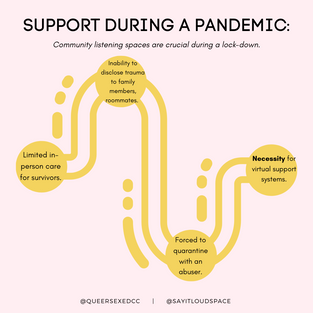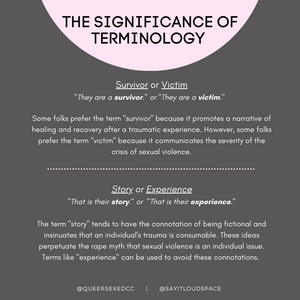The Importance of Community in Healing from Sexual Violence: a Conversation with Say It Loud Space
- Queer Sex Ed CC
- Mar 26, 2021
- 4 min read
Updated: Apr 21, 2021
Content warning: discussion of sexual violence and assault.
Last week we spoke with Meriel (she/they) and Rowan (they/he) from Say It Loud Space (@sayitloud on Instagram) about their work in supporting survivors of sexual violence. Say It Loud is a “support group & listening service for individuals who have experienced sexual violence.” Their team consists of both support mentors (answering messages, reaching out to folks, asking for advice) and the media team (content creation, posts, stories, writing blog posts, and producing videos). They also have a campaign team under development, with the goal to organize together to change policies surrounding sexual violence. Everyone helps out everywhere - it is truly a communal effort.
Community and healing
Their goals are numerous but incredibly interconnected. First and foremost, the mission of this organization is to create a safe space for people to talk about their experiences with sexual violence, to offer them space to work through their feelings and trauma, and to help people understand the context of these traumas in society.They focus on creating support systems that reach communities that might be typically excluded from the conversation and resources regarding sexual violence; such as the LGBTQ community.
Post-pandemic, Say It Loud wants to offer a variety of in-person services. These may include workshops in schools, listening meet-up services in coffee shops or the like, and campaigns addressing legislation and government responses to sexual violence.
Support during a pandemic
During the pandemic, their work has focused on direct listening support. We spoke about how important this virtual community has been to survivors during lock-down. Online communities can be a tool for folks who are dealing with trauma, who can’t talk about it in their living situation, or who may even be quarantined with their abuser.
Terminology
We spoke about the terminology (survivor or victim, story or experience), and the intricate nuances of these words. Both Say It Loud and QSECC use the terms “survivor” and “victim” interchangeably; ultimately it is up to the preference of the individual. However, Say It Loud makes a point to stay away from terminology such as calling someone’s experience a “story.” They described how this word insinuates that their trauma is not real, or otherwise, is consumable. Words like this perpetuate the rape myth that this is “an individual issue and not a collective issue” - Meriel.
Misconceptions about sexual violence
We asked Say It Loud, “What do you think is one of the biggest misconceptions regarding assault and experiencing trauma?”
They explained that one of the biggest misconceptions regarding sexual violence is that it’s something that only happens to women. As Rowan articulated, “There is a lot of intersectional identities that happen when we talk about sexual violence.” They elaborated, saying there is a myth that women are asking for it, but actually, this affects everyone, no matter how you present, your age, etc. Essentially, it can happen to anyone.
The intersectionality of someone’s identity can be deeply entangled with their experience with sexual violence. For instance, based on a recent survey by Say It Loud, data suggests that queer folks’ experiences with sexual violence made them struggle with their expressions of masculinity and femininity, and ultimately affected their gender expression.
Medicalization of assault
We spoke about the medicalization of sexual violence, and how the expectation that as soon as someone experiences violence they have to report it, go to the hospital, or call the police. This can be incredibly damaging, even retraumatizing to the victim. Further, as Meriel explained, “When it's clinical, some experiences can be overlooked because they don't fit into a certain box.” For masculine-presenting folks, queer people, and BIPOC, their experiences with sexual violence are often trivialized and ignored by the governmental institutions meant to deal with the aftermath of sexual violence.
Non-clinical spaces
We wanted to ask Say It Loud about the specific nature of their organization as a non-clinical, peer-led space. Often, experiences of sexual violence are immediately medicalized and legalized, bringing both victims and their stories into the realm of institutions like hospitals or court systems. In these spaces, survivors are too often retraumatized, due to the objective or clinical (and typically apathetic) nature of these spaces. We asked them if they could speak a bit on how this unique position factors into their work.
They emphasized that Say It Loud is a listening service, not a crisis or mental health service. Their sole focus is to provide space, to listen, and to educate. “We’re not going to classify, give legal advice, label, or anything.” Say It Loud is intended to be an open resource to help people process what they’ve been through. In cases where survivors are looking for clinical or legal help, Say It Loud can offer resources or refer them, but they do not provide those services themselves.
A note: Say It Loud & QSECC want to be transparent in that we’re not discouraging folks from going to the police to report an assault, or going to the hospital to receive immediate care. We want to be clear that these are often necessary steps. We offer these community-based alternatives to promote the fact that there are other options to turn to instead of or alongside those more traditional options.
Resources for survivors
Domestic Violence Support hotline: 1-800-799-SAFE (7233) or live chat at https://www.thehotline.org
Resources by state: This website is an archive of resources to support people in situations of domestic violence, organized by state. https://www.womenshealth.gov/relationships-and-safety/get-help/state-resources
Financial Help for People in Abusive Situations: This website offers tips, support, and instructions on how to secure your finances while escaping abusive situations. https://www.moneygeek.com/financial-planning/resources/financial-help-women-abusive-relationships/

















Comments